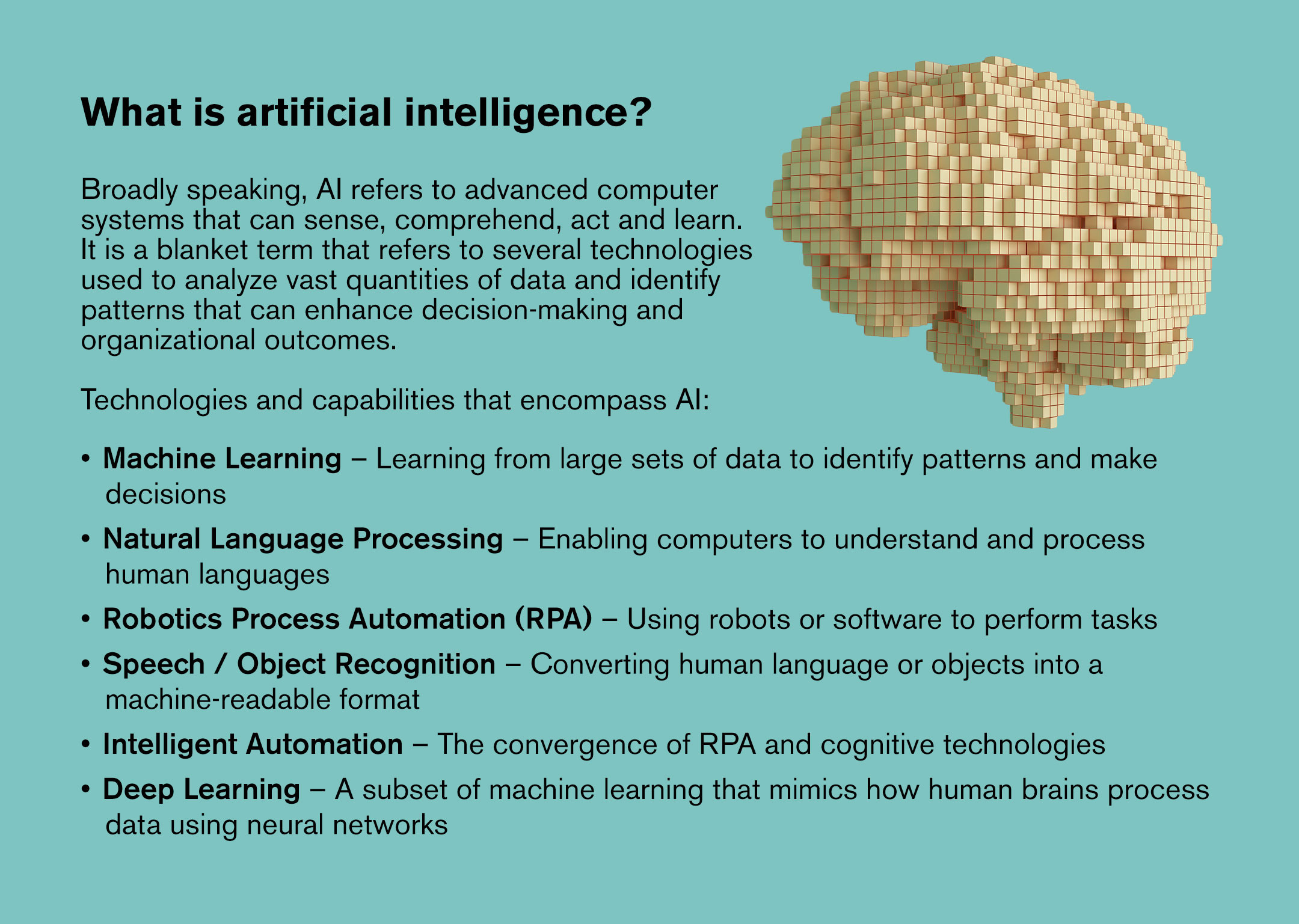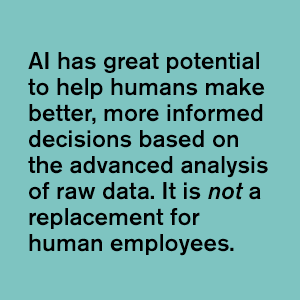Article
Digitalization has fundamentally transformed the economy and society in Canada and around the world. This digital transformation is being driven by significant advancements in artificial intelligence (AI), robotics and automation, big data analytics, 5G connectivity and the Internet of Things, and is being accelerated by broader shifts propelled by the coronavirus pandemic. The current technological revolution is redefining how organizations connect to and interact with customers in the digital era, how they build and sustain their workforces, and how they operate internally.
AI in particular has become a pivotal technology behind financial technology innovation. Banks in Canada have firmly entered the intelligence age and are on their AI journeys. Banks are today balancing the opportunities and challenges presented by AI and are using it to improve the customer experience and increase efficiency. Through AI technologies, they are developing business plans and strategies that will help deepen relationships with their customers through more customized and personalized experiences, create new innovative products and services and help transform how they work as the nature of work evolves.
AI is real, has arrived and has many benefits, but it is not a panacea. It also brings challenges and barriers to adoption that must be addressed and considered carefully.

Evolving applications of AI in banking
Using data to help solve problems and make more informed decisions is not a new idea. Banks have a longstanding history of leveraging data to improve the customer experience and manage the operations of a complex business. What has changed is the increased availability of data in a digital economy and the ability for banks to use large data sets to understand and explore new opportunities. At their core, AI technologies and capabilities can help improve banks’ ability to make sense of the exponential increase in data.
The banking sector was an early adopter of AI. The earliest forms of AI, for instance, were already being used in banking in the 1990s to strengthen fraud detection systems. The pace of AI development, however, has skyrocketed in recent years, which has led to an ever‑greater number of AI‑enabled processes used to improve the customer experience and rethink operating models. Financial institutions around the world have moved beyond the theoretical and now fully recognize the tangible, real‑world potential of a human‑led workforce supported by responsible AI.
 The banks that stand to benefit the most from AI are those willing to reimagine their current approaches to people, processes and data. AI has great potential to help humans make better, more informed decisions based on the advanced analysis of raw data. It is not a replacement for human employees. Integrating AI into bank operations also enables employees to direct their efforts to more strategic, complex and creative work that drives the greatest value for the organization. In other words, it should be viewed as a strategic set of tools used to enhance the efforts of a human workforce. It makes banks even better at what they do, while also providing meaningful improvements in a key area: customer experience.
The banks that stand to benefit the most from AI are those willing to reimagine their current approaches to people, processes and data. AI has great potential to help humans make better, more informed decisions based on the advanced analysis of raw data. It is not a replacement for human employees. Integrating AI into bank operations also enables employees to direct their efforts to more strategic, complex and creative work that drives the greatest value for the organization. In other words, it should be viewed as a strategic set of tools used to enhance the efforts of a human workforce. It makes banks even better at what they do, while also providing meaningful improvements in a key area: customer experience.
Evolving applications of AI technologies and capabilities in banking
Deepen customer relationships
- As more customers bank through digital channels, develop deep and trusted relationship online with AI;
- Better connect unstructured customer data across disparate and disconnected legacy systems;
- Use AI‑derived customer analytics (i.e. behaviour, spending patterns, cross‑sales, etc.) to provide custom recommendations; and
- Virtual assistants, or 'chatbots', to help customers complete transactions and solve problems via 24/7/365 customer support.
Enhance the way banks operate and manage risk
- Develop a better understanding of risks through enhanced models and analysis of unstructured data;
- Automate manually intensive data management tasks;
- Natural language processing to help better understand requirements for products and services to meet both internal and regulatory requirements; and
- Facilitate the work of compliance officers, highlighting regulations or guidance that may impact operations at home and abroad.
Protect customer data by strengthening cyber security and preventing financial crime
- Automate customer identity verification and due diligence requirements to more quickly and accurately manage risks.
- Use intelligent automation (convergence of automation and cognitive technologies) to improve cyber resiliency.
- Develop real‑time anti‑fraud monitoring.
- Reinforce anti‑money laundering (AML) systems through AI‑powered technologies.
Canada’s AI Advantage
Canada is regarded as one of the global leaders in AI innovation. And rightly so. The federal government has in recent years taken a number of important steps to develop research and talent in Canada through initiatives such as the Pan‑Canadian Artificial Intelligence Strategy and the Advisory Council on Artificial Intelligence.
Canadian banks have played a key role in helping to build Canada’s AI advantage. To be sure, a number of banks have developed tech‑driven solutions in‑house and through strategic partnerships to help fuel their own innovation activities, as well as support the broader Canadian AI ecosystem through strategic alliances with educational institutions.
Canada has made great strides to become a global center of influence in AI, with highly regarded specialists clustered in Toronto, Montréal and Edmonton. Canadian leadership in AI stems from a decades‑long focus on building world‑class educational institutions and attracting prime academic talent. This has positioned Canada as a key breeding ground for the next generation of AI professionals.
Looking ahead
Banking is transforming at a record pace, bringing innovation and new potential to empower people’s lives in an increasingly digital‑first world. Now more than ever Canadians value convenience through technology, and perhaps doubly so given the broad shift to digital driven by the global public health response to the COVID‑19 outbreak. To that end, Canada’s banking sector is continuing its decades‑long leadership in developing new innovations that make banking convenient, accessible and secure for all customers.
AI is no different. Banks in Canada recognize the enormous opportunities presented by AI to improve the speed and accessibility of services and to provide a more customized and personalized experience for customers. As with all technological leaps, however, the AI revolution brings distinct new challenges. Banks in Canada are moving forward with purposed focus and will continue cultivating a broad dialogue on all aspects of AI’s development in the banking sector as its component technologies continue to evolve.